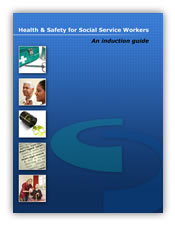The organisationThe overwhelming majority of workers in the social service sector work within formal organisations. The size and composition of these organisations vary from very small organisations with few employees, to large service organisations with thousands of employees. Regardless of the size of the organisation good practice in staff induction would suggest that new staff need some basic information about the organisation they have joined in order to be effective. |
|
Although this may seem obvious, or even redundant (given that the worker has just been through the recruitment process), it is important that new workers are able to access information which gives them basic information regarding the organisation.
- Organisational overview and structure – background/historical information about the organisation; organisational structure; links to other organisations/services etc.
- Who's who? – photos, names, roles, responsibilities.
- Statement of purpose – What are the goals of the organisation? What is its main purpose and how does it set out to achieve it?
- Services provided – What range of services are provided by the organisation and to whom?
- Workplaces – How many? Where? Service user group(s)?
It's likely that new workers will also find value in discussing the aims and objectives of the particular service they are located in with other people in the workplace. This aspect of induction is covered elsewhere in the framework.
Communication is an area often taken for granted, or where the focus is entirely on external communication (ie with service users, carers, other representatives of other agencies or services). What is most often neglected at the point of induction is an exploration of the, at times, unwritten rules regarding internal communication.
For the new worker, regardless of previous experience, there are a number of key areas where guidance and information are required:
- are there protocols for making contact with senior officers of the organisation (beyond one's immediate workplace)?
- are there organisational polices or accepted implicit rules regarding the use of internet/email/fax/telephones etc.?
- are there standard letters and report templates in use in the organisation, and if there are, is it permissible to alter them for specific purposes?
- are there expectations regarding record keeping that workers need to be aware of?
- do elected members/board members etc. have direct access to staff?
External communications has it's own cluster of issues, many of which, though they appear common sense to those familiar with them, can be overlooked by new staff.
- When external organisations contact us for information, are we expected to verify identity? If yes, how?
- What do I do if members of the press contact me directly or contact the organisation where I am the first point of contact?
- Are there organisational (as well as professional) expectations regarding my communication with service users, carers and other stakeholders?
- Does the organisation have formalised liaison links with other agencies? If yes, are there named individuals I need to be aware of?
Some of this will undoubtedly become familiar to the worker as they become more familiar with the organisation. However, in order to ensure a smooth induction, it is important that as many of these issues are addressed in a structured fashion at an early stage. As a general rule, it is a good idea to supplement printed information with other types of activity to maximise retention of the information.
In addition to the policies and procedures which relate to their role as an employee engaged in delivering services on behalf of the organisation, new staff need to be equipped with information regarding themselves as employees of the organisation. The covers the full range of human resource policies including annual leave entitlement, pay and grading issues, discipline and grievance, any employer specific codes of conduct, travel and subsistence etc..
It is often taken as read that new starts have had this information during the recruitment and selection process. However, even if this was the case, it is likely that much of that information has already dissipated, during what can be a stressful process in which the individuals' focus is on securing employment rather than absorbing information regarding policies which they may or may not have to become familiar with (depending in the outcome of selection).
The Code of Practice for Employers of Social Service Workers sets down the responsibilities of employers in the regulation of social service workers. The code requires that employers adhere to the standards set out in their code, support social service workers in meeting their code and take appropriate action when workers do not meet expected standards of conduct. The Code defines the employer's role in supporting high quality social services. In this context, these aspects of the Code define the employer's responsibility in relation to induction;
- make sure people are suitable to enter the workforce and understand their roles and responsibilities. Specifically: Giving staff clear information about their roles and responsibilities, relevant legislation and the organisational policies and procedures they must follow in their work;
- provide training and development opportunities to enable social service workers to strengthen and develop their skills and knowledge . Specifically: Providing induction, training and development opportunities to help social service workers do their jobs effectively and prepare for new and changing roles and responsibilities.
However, in addition to this, it is important that staff know what your role is as an employer in supporting them in all aspects of their work, to provide high quality services. At the point at which workers are joining the organisation, it is important to help them make links between the generic statements in the Codes of Practice and organisational policies and procedures which relate to their service area or to them as employees.
Social service workers must be enabled to understand that they are accountable for the quality of their work and for maintaining and improving their knowledge and skills. In order to do this staff need support to:
- understand their job
- understand any new procedures that are put in place and attend training for these if necessary
- question poor practice
- have opportunities for supervision and on-going learning and training
- have opportunities for constructive feedback from service users, carers, colleagues and other relevant people. Find ways of engaging with children that means you get feedback from them.
- contribute positively to working with and learning from people from different backgrounds and agencies who may be working alongside them or in partnership with them
- keep a personal development plan and a learning log/reflective diary of their on-going learning and development
At the induction stage, employers and, in particular, line managers, should ensure that new staff members are informed about the organisation's policies and procedures in relation to the points above. However, more important than policy statements is the manager's role in creating a working environment which actively promotes reflection on practice and the continuous development of staff.
Employers need to be aware that they have a legal responsibility under the Health and Safety at Work Act 1974 to undertake a risk assessment and provide appropriate training for staff based on the outcomes of their risk assessment.
All employees need some information regarding Health and Safety at work. This can range from ensuring that new staff are aware of the exits and arrangements in the event of fire in their workplace, through to personal safety issues for community-based lone workers.
In addition to information regarding to Health and Safety, new staff need to be informed about organisational policies and practices which are designed to protect them as employees – Is there an expectation that community based staff check in with coordinating staff, if so, how often? Does the organisation provide personal alarms/mobile phones or other technological aids to safeguard staff? etc.
Staff also need to be aware of their responsibilities in respect of their own safety and also the safety of service users. Staff in direct personal care roles may also require specific information and training in relation to:
- moving and handling
- health and hygiene
- infection control
SSSC has developed an iPad based learning resource focused on Health and Safety for social service workers. This resource contains a wealth of relevant information and a range of activities designed to encaourage staff to apply their learning in the the workplace. You can get this free learning resource here. |
 |
 |
Most staff working directly, and most often, indirectly with service users and carers will find themselves handling information regarding their specific circumstances. In addition to being sensitive to the issues around confidentiality (discussed above), there are certain key pieces of legislation which staff should be made aware of at the point at which they join your organisation:
- the Data Protection Act 1998
- the Freedom of Information (Scotland) Act 2002
It is important that all staff are aware of their responsibilities with regard to managing confidential information, in the context of their job role: What information is held by the organisation? For What purpose? Who has the right of access to that information?
What do they need to consider when they are recording information regarding service users/carers in the course of their duties? What are the organisation's procedures in relation to requests for access to information?
Although much of the basic information can be presented to staff in written form, this is not always the best way to ensure that the issues are understood. Therefore, it is suggested that inductees are encouraged to talk to the key staff in the organisation regarding this issue (starting with their line manager). The use of “case study” examples is often a good way to enable staff to apply the broad concepts and procedures to situations which may arise in their work context.
It is important that staff understand no only the legislative requirement and how to apply organisational procedures. It is important that they appreciate that assessment and other information held by social services organisations can cause distress to individuals and therefore, the access to information needs to be handled sensitively. Some specific training may be required for inductees. This needs to be tailored to fit with their level of experience and/or training prior to joining your organisation.
Most modern organisations have some system for performance management and development. The precise nature of appraisal/review varies from organisation to organisation. Some systems emphasise performance management, whilst others emphasise staff development. Clearly in the early stages of employment, it is important that staff are made aware of the precise nature of the system in your organisation.
This should cover not just the “administration” of the system (ie forms which have to be completed, meetings scheduled for planning, review and assessment etc.), but should also familiarise new staff with the philosophy behind the system in your organisation. New staff should also be signposted to sources of help and support in the early stages of their employment.
Staff come to organisations with varying levels of experience, knowledge, skills and qualifications. Regardless of their starting point or their job role/grade, all staff need to maintain their development as social service practitioners.
Individuals have some responsibility for ensuring they continue to develop (as defined in the SSSC Code of Practice for Social Service Workers), but as their employer, the organisation also has responsibility to provide opportunities for staff development as defined in the Code of Practice for employers published by the SSSC.
Therefore, when joining the organisation, all new employees should be informed of the arrangements for accessing learning and development opportunities in the organisation. This could include discussions with learning and development personnel where appropriate, but may be restricted to a discussion of opportunities with the worker's line manager (in small organisations).
Increasingly, staff development is linked to appraisal or qualification schemes, but in principle, should also be flexible enough to respond to particular individuals needs of staff (in the context of their job role).
Quality assurance is another common feature of modern public services. Whether the commissioner or the commissioned, social service organisations are actively involved in monitoring the quality of services and are held accountable for the quality of services on an ongoing basis. Therefore, it is important that staff joining organisations not only understand the general principles of quality assurance and the administrative aspects of the system in operation in the organisation, but also have a full appreciation of their role in the provision of a quality service as a social service worker. Further, an understanding of the purpose of the monitoring of services in terms of outcomes for service users will be important to enabling staff as seeing this process as an integral part of delivering services and not just a burdensome administrative task. The links between their job role and the relevant parts of the National Care Standards should also be highlighted.



